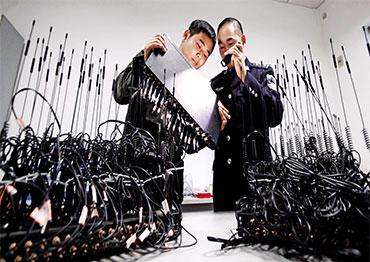With enough data, fraud gangs can tailor personalized fraud. Shanghai Municipal Public Security Bureau Pudong Sub-bureau anti-fraud special team leader Hu Qiaoyue said that victims of the “pig killing trap” scam are often young single woman who are financially stable, while “brushing fraud” for online sales platforms often targets college students or housewives who may have spare time. Brushing fraud involves luring victims through offering part-time job opportunities by sending online fake orders and writing comments. But victims will be asked to invest money to buy the products first and fraudsters are supposed to refund the money, although in reality, they will not. This occurs more often on social media apps like WeChat than on dedicated online shopping platforms.
A sophisticated industrial chain has been formed around telecom and internet fraud. NewsChina learned from inside sources that the four main sectors of the online fraud industry chain include development and production, wholesale and retail, fraud implementation, selling illegal gains and profit distribution, with as many as 15 specialized jobs. For example, technical support work includes phishing – persuading people to reveal personal information – Trojan development and hacking activities to specifically provide fraud tools and all information needed. Behind the scenes, wholesale and retail includes people involved in wheeling and dealing – selling criminal information, goods or tools – phishing retailing, domain name dealer, personal information wholesaler, as well as bank card dealers, phone card dealers and ID card dealers. Others, with job titles like telecom fraud manager or online promotion technicians are in direct contact with victims. Agencies are contracted to send mass spam text messages.
Hu Qiaoyue drew attention to online data diversion teams who register and sell active accounts on social platforms to fraud gangs. When a victim’s money is successfully transferred to a target bank account, people in the gang ranging from an accountant, ATM money collector or a stolen goods middleman work together to transfer, withdraw and launder the cash.
A specialized money laundering team will split the stolen money into smaller amounts that will not attract the attention of bank risk control software, and transfer it to a secure account. Many fraud gangs now use crypto currency for money laundering, posing even bigger challenges to the police in recovering stolen assets.
“Telecom fraud crime used to be a gang or family-run crime, but now it’s developed into a for-hire mode, with almost every stage fulfilled by an independent team,” Hu Qiaoyue said. Starting in 2008, the rollout of 4G technology aided telecom and online fraud crime to develop into this industrial chain model with corporate-style operations.
Some independent fraudsters began to form groups and developed into specialized, professional businesses. In a recent case of a busted “pig killing trap” in Jinhua, Zhejiang Province this year, the gang implemented a corporate operation with clear divisions of labor. They regularly replace their fraud platforms, and rotate personnel to avoid police detection and crackdowns.
“A salesperson gets a basic salary of 4,000- 5,000 yuan (US$618-772), plus a 7 percent commission from the money they make [from victims]. The group leader can take a 3 percent commission of the income of the whole group,” a police officer who investigated this case told the reporter.
Hu Qiaoyue told NewsChina that in a fraud case cracked this May by Shanghai police, they found the gang worked out of Luoyang, Henan Province, while the platform builder was in Wuhan, Hubei Province, and there were 29 “branches” in 10 provinces. Some fraud operations are even trying to create their own “corporate culture.”
According to Hu, most telecom and network fraudsters are young people in their 20s and 30s. According to data provided by the 2018 Network Black and Gray Industry Management Research Report, some 400,000 people are involved in the black and gray industries in China, and their average age is under 23.
“Research shows perpetrators are getting younger and more women are joining the business. Fraud gangs recruit people in China but train them in neighboring countries such as Myanmar. There are actually a lot of people who choose this path due to lack of proper job opportunities for youth and low wages for conventional jobs,” Wu Boxin said.

 Old Version
Old Version




